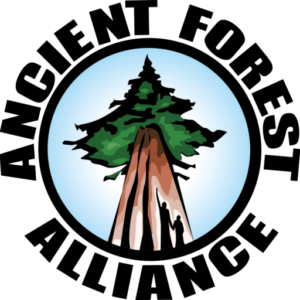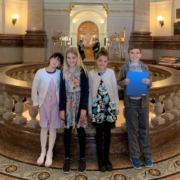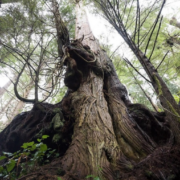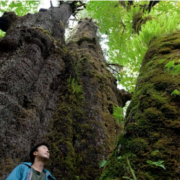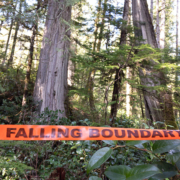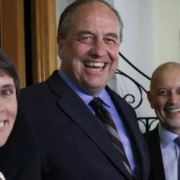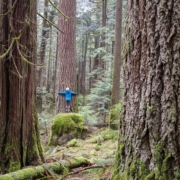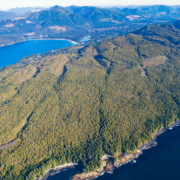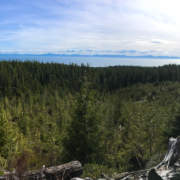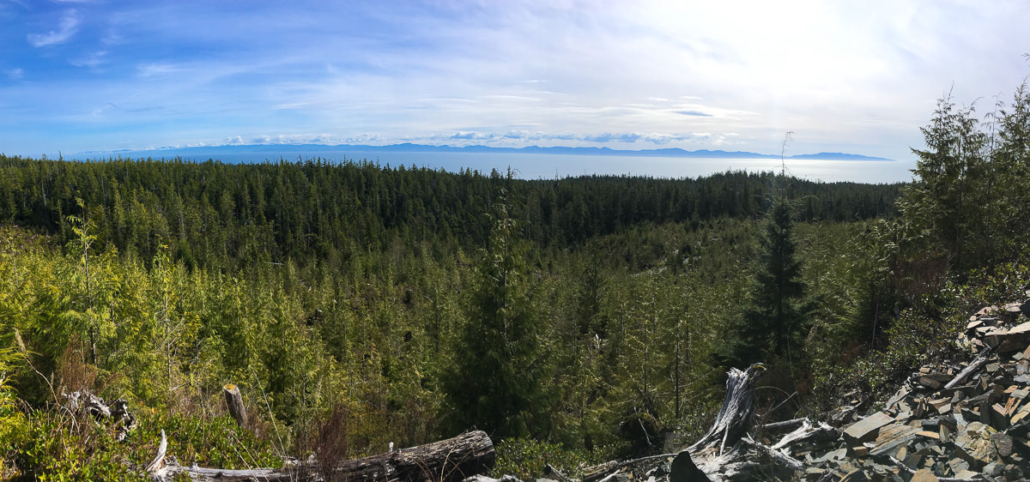Times Colonist
May 14, 2019
The provincial government should immediately halt the logging of old-growth forests on Vancouver Island, the B.C. Green Party said Monday. However, B.C.’s minister of forests rejected a moratorium, saying it would be devastating for the Island’s forestry workers.
In the legislature, the Green Party called on the government to impose a moratorium on old-growth logging and develop more sustainable forestry practices that protect vital ecosystems.
The call comes amid uncertainty around the B.C. government’s plans to log 109 hectares of old-growth forest near Juan de Fuca Provincial Park.
“Our coastal old-growth is not a renewable resource — and there’s not much left,” Sonia Furstenau, Green MLA for Cowichan Valley, said in a statement. “These globally rare ecosystems support threatened species — including wild salmon — and keep our water and air clean.”
Furstenau said the government should protect the last few remaining intact old-growth forest “hot spots” on Vancouver Island and transition to second-growth logging, which focuses on cutting trees that have regrown after a timber harvest.
“Logging old-growth is short-sighted,” said Furstenau. “It jeopardizes the job stability, local economies, and ecosystem health.”
Forests Minister Doug Donaldson said more than 500,000 hectares of old-growth forests on Vancouver Island are already protected in provincial or national parks or other designated areas.
“Over half the old-growth forests on the coast of Vancouver Island are protected. So we have a lot of old-growth forest protected already,” Donaldson told the Times Colonist. “And the remainder of the areas that are being managed, if we implement an immediate moratorium in those areas, the impacts to the forest sector on Vancouver Island would be devastating.”
There are 24,000 people who work directly in the forestry sector and many of those people would lose their jobs if a moratorium is imposed, said Donaldson, adding there are not enough second-growth trees to replace old-growth cutblocks.
Last week, the Ministry of Forests confirmed that a controversial plan to log old-growth forests near Juan de Fuca Provincial Park had been postponed for a second time following a public outcry.
The ministry said B.C. Timber Sales, a government agency, had pulled its advertisements for the auction of 109 hectares of forest in seven cutblocks — including two that come within 50 metres of the park.
The ministry said it needed more time to engage with a local stakeholder who was missed during the initial referral process.
Jon Cash, co-owner of Soule Creek Lodge, received an email from B.C. Timber Sales saying the sale had been “postponed/ removed” to allow for more engagement with the lodge.
Cash has said the noise of chainsaws and road blasting will be devastating for the lodge, which is located near the proposed clearcuts.
Donaldson said the ministry also plans to investigate information provided by environmental groups that there are legacy trees — particularly old and large trees — in the cutblock.
“Best practices of B.C. Timber Sales is to preserve those legacy trees, so that’s why the timber sale was taken off B.C. Bid,” Donaldson said.
The Port Renfrew Chamber of Commerce decried the original logging plans, saying clear-cutting the forests would do irreparable harm to tourism in a region that has branded itself Canada’s Tall Tree Capital.
The Green Party says 79 per cent of the original productive old-growth forests on Vancouver Island have been logged, including 90 per cent of the valley bottoms where the largest trees grow. Despite that, B.C. Timber Sales continues to auction off the remaining Crown-owned old-growth for logging.
Green MLA Adam Olsen, the party’s forestry spokesman, acknowledged the importance of forestry jobs, but said thousands of jobs have been lost over the decades due to poor forestry management.
“We want high-paying jobs that are not vulnerable to boom-bust economics,” he said. “There are mills on Vancouver Island that can only process old-growth.
“But old-growth is a finite resource, and most of it is already gone. That means those forestry jobs are at risk.”
In February, environmental advocacy group Sierra Club B.C. delivered a petition signed by 20,000 British Columbians to five NDP MLA constituency offices, including the Vancouver-Fairview office of Environment Minister George Heyman.
In June 2018, 223 scientists from nine countries signed a letter urging the provincial government to take immediate action to protect B.C.’s temperate rain forests.
The B.C. Greens say they’ve received more than 20,000 emails from British Columbians asking why the province fails to protect old-growth trees.
In the next six months, Donaldson said, the government will begin a public consultation process with First Nations groups and communities across Vancouver Island as it develops a sustainable forest management plan.
Last year, the NDP government protected an additional 70,000 hectares of old-growth forests on southern Vancouver Island and the southern mainland to ensure an undisturbed habitat for marbled murrelet and coastal northern goshawk, Donaldson said.
An additional 1,000 hectares of old-growth Douglas fir was also protected on the east side of Vancouver Island.
Furstenau said the government is inflating the amount of old-growth forest that is protected.
“The government cannot continue to talk about a future strategy while actively logging these endangered forests,” Furstenau said. “They must act now, or British Columbians and future generations will suffer consequences.”
kderosa@timescolonist.com
lkines@timescolonist.comm
See the original article
